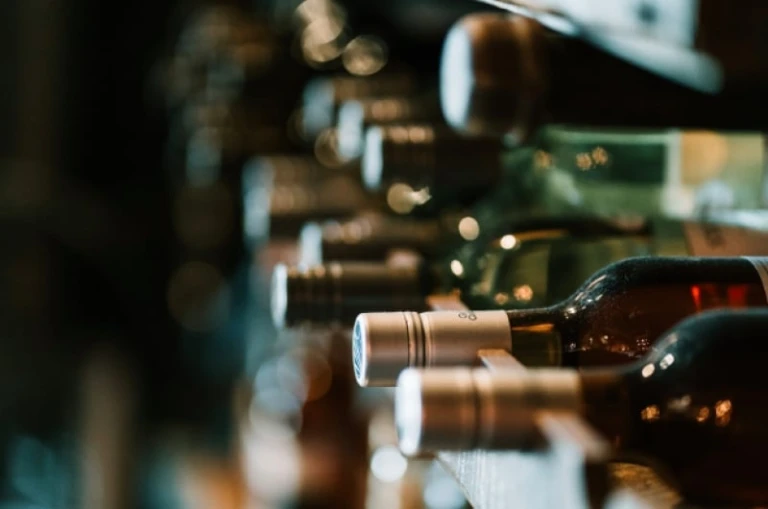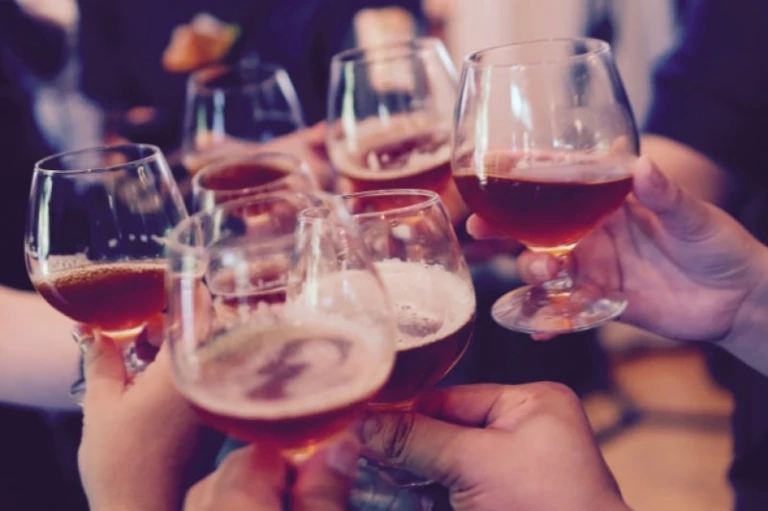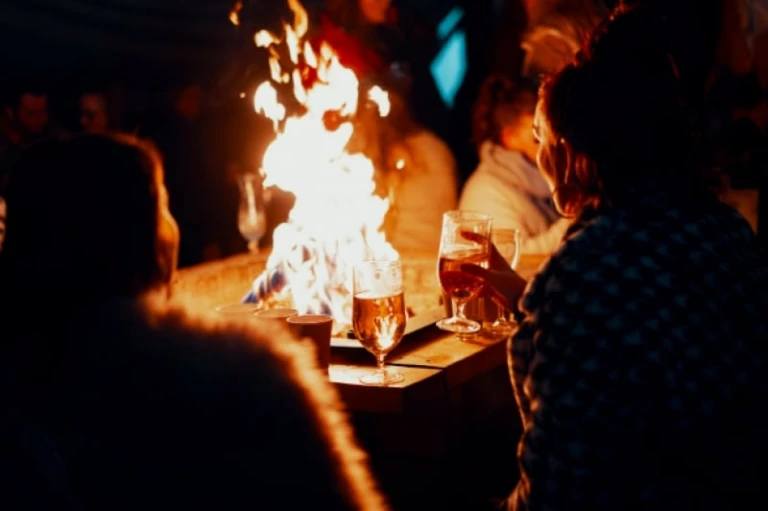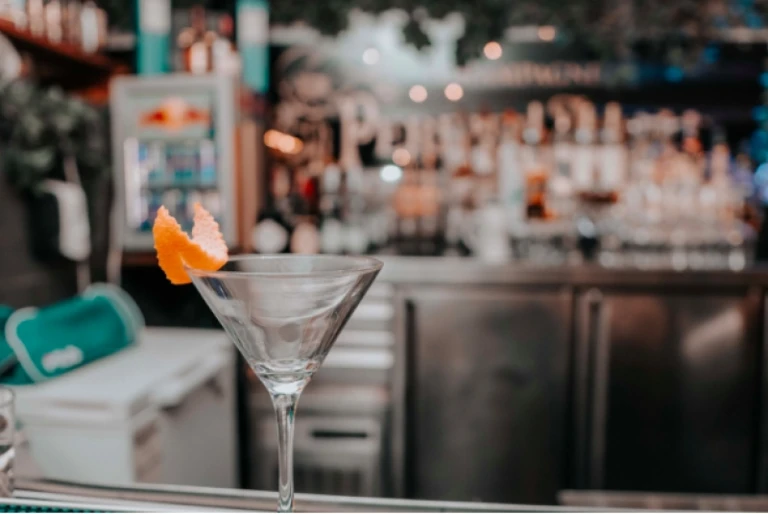Look for these logos before you EAT!
Is Alcohol Haram in Islam?

Is Alcohol Haram in Islam – Alcohol, to many around the world, is a staple part of life. Some consume it daily, others during special occasions.
In Islam, everything about alcohol is deemed haram (forbidden or prohibited). We were raised learning the multiple verses regarding the abstinence of alcohol in the Quran. Rules have been clearly set in the Islamic (Sharia) law that alcohol should be avoided.
Yet these days, believe it or not, drinking is still very common among modern Muslims. In fact, if we look back a couple of centuries ago, booze was even more common before the introduction of tobacco and coffee as substitutes – even among prominent Muslims and even caliphs.
The alcohol industry in Middle Eastern countries, like Egypt for example, is booming and only the most conservative countries actually impose a legal ban on it.
Some may insist that it’s black and white — haram means haram. But the lines are blurred for others, when they reanalyse the verses in the Quran and Hadiths, or when they look back at history.
Alcohol Consumption in Islam

“The millions of Muslims around the world who drink may do so knowing that some of the religion’s greatest poets, thinkers, scientists, and politicians enjoyed a glass or two.”
— Alex Rowell, author of Vintage Humour: The Islamic Wine Poetry of Abu Nuwas
There are plenty of historical evidence showing that numerous Muslims, not just normal Muslims, but leaders, caliphs and other prominent followers throughout the ages indulge in alcohol. These include the Abbasid ruler Haroun al-Rashid, and many others who still held onto their titles such as “commanders of the faithful”.
In Pre-Islamic Arabic poetry, there have been countless of poems famous for their odes to wine, known as khamariyat. This continued into the Islamic era, where the strings of wine-related poetry was widespread.
Names such as Abu Nuwas (Haroun al Rashid’s camp court poet), Omar Khayyam and the legendary Sufi mystic Rumi are among those who penned endless praises of wine.
There might have been a relatively relaxed attitude towards alcohol in the early centuries of Islam, probably due to doubts and confusion as to whether the Quran actually prohibits the consumption of alcohol or merely recommends abstinence.
Since then the religion had hardened into rigid orthodoxy, especially when it comes to the topic of alcohol.
Regardless, Muslims have every right to consider alcohol as haram, but we must also accept that alcohol has always been an integral and largely tolerated aspect of Islamic culture.
Also Read: Heineken 0.0: Alcohol-Free Beer Causes Stir in Malaysia
The Prohibition of Alcohol in Islam

It is made pretty clear that Muslims are not allowed to drink alcohol, even in small quantities. Most say that the reason behind this prohibition lies in the intoxication effects of alcohol.
It’s akin to instances when people are asleep – they are not in control of their minds (as accountability of humans solely is determined by their mental capacity). Alcohol falls under the same category.
In the Quran, there are four verses that discuss the negative perception of alcohol. This is the first verse:
“And from the fruits of the palm trees and grapevines you take intoxicant and good provision. Indeed in that is a sign for a people who reason.” (16:67)
God the Almighty described the grapes (that are in wine) as wholesome and good, however left out praising the state of inebriation they produced. The Arabs who inferred from these words well understood the disapproval.
This is the second verse:
“O you who have believed, do not approach prayer while you are intoxicated until you know what you are saying or in a state of janabah, except those passing through [a place of prayer], until you have washed [your whole body].” (4:43)
The wording of the verse makes it sound as though it is fine for Muslims to be inebriated at any other time of the day (except during prayers). Drinking was entirely halal in Islam’s earliest years — during the Prophet’s time in Mecca, and for a while after his migration to Medina in 622. Drinking was still allowed, but there were conditions to be followed.
This is the third verse:
“They ask you about wine and gambling. Say, ‘In them is great sin and [yet, some] benefit for people. But their sin is greater than their benefit.’” (2:219)
The verse ultimately says that there is benefit and good in wine, even though the sin outweighs it. While this is yet another verse that disapproves alcohol, it also praises it.
The fourth verse is traditionally held by Muslims as God’s final word on the subject of alcohol:
“O you who have believed, indeed, intoxicants, gambling, [sacrificing on] stone alters [to other than Allah], and divining arrows are but defilement from the work of Satan, so avoid it that you may be successful.” (5:90)
It is also said, along with this verse, that alcohol is “a tool to stoke enmity and hatred between believers” and “keep you from remembrance of God and prayer.”
Along with the hadiths, the words of the Prophet are used to provide religious justification on the ban of alcohol. As such, majority of the Islamic scholars are against the consumption of it.
Yet, there is no one verse in the Quran that specifically forbids Muslims to drink alcohol. Some, even theologians of the early Islamic period, disagree that these verses forbade inebriety, as it does carrion, blood and pork (5:3).
The verbal form of haram wasn’t used, instead the imperative in 5:90 is “so avoid it” (fajtaniboohu).
If alcohol is so haram and we ought to stay away from it, why is it mentioned in describing the sceneries of Paradise, as mentioned in this verse:
“Is the description of Paradise, which the righteous are promised, wherein are rivers of water unaltered, rivers of milk the taste of which never changes, rivers of wine delicious to those who drink, …” (47:15)
The Islamic Community’s Varied Perceptions

There are some Muslims who suggest that the seriousness of the command was not understood very well. Some consider it to be a violation of a fundamental order, while others take it rather lightly, arguing that it’s better to be a good human being and drink than commit unforgivable sins and not drink.
As it’s generally believed that drinking causes harm to oneself and others, some can claim that drinking in small amounts for leisure, social reasons and fun is acceptable – just as long as it’s harmless.
Today, majority of Muslims believe that alcohol is haram, while a smaller group thinks that it is actually the act of getting drunk that is forbidden.
What Drinking Alcohol Actually Does

It is true that alcohol can cause a lot of negative consequences. Situations, news and events around the world are proof of that. Most of the time, these are results of overindulgence of alcohol. There are ways to prevent them, and laws to enforce them.
Contrary to popular belief, the effects alcohol aren’t all bad. Look past the surface and obvious judgements, and have a fresh take on it.
All around the world, alcohol is used to bring people together at parties, events and social gatherings. While it is not important, those who drink have created a stigma on people who don’t drink – they are labelled ‘weird.’
One woman, Nashwa Khan, wrote that she felt that no one seemed to enjoy her company as she wasn’t drinking, and it made her a type of likable that she hadn’t experienced before after she joined in (although in her case, it’s pretending to drink instead of consuming it). Is Alcohol Haram
“I can only infer there is a kinship between drinkers that could not be attained in other ways, something like the bonds that form between social smokers in office workplaces.”
“One woman told me, “Cutting alcohol and bars out of my life has definitely been detrimental to my social life.’”
— Nashwa Khan
While it isn’t the best way to make new friends or bring people together, think of alcohol as a tool that opens new doors and opportunities. Just as how other people are confused about Muslims’ abstinence, we’re curious about others’ constant indulgence.
Also Read: “Halal Alcohol”: Is It Really Safe for Muslims to Drink?
Some Muslims Enjoy Alcohol Responsibly

There’s no denying that there are some of us Muslims who drink. Allowing for the benefit of the doubt, they’re almost always responsibly.
By that, it means not overindulging to the point of passing out and losing full control of themselves. Some can be put in situations that they are required to — like a company event where the only beverage served is wine, or a social gathering where your absence is considered extremely rude.
Is it considered unfortunate, though, that the number of Muslims indulging alcohol is rising? When in fact, it was already a cultural norm back in the early days.
“The millions of Muslims around the world who do drink may at least do so in the knowledge that, so far from being deviants, betraying their heritage or cultural identity, they are in fact sharing in a wholly indigenous ritual performed by their coreligionists throughout the entirety of Islamic history, extending back to the Prophet’s own lifetime. How’s that for respecting tradition?”
— Alex Rowell
Is One Who Drinks Less of A Muslim?

“As a Muslim who drinks – one who couldn’t imagine her life without the pleasure of wine, or the satisfaction of a cold beer after a long day – I’ve wondered how this bears on my religious self. Does it make me less Muslim? To some, the answer is yes, of course it does. You can’t pick and choose which religious tenets and principles you adhere to–it’s all or nothing, they might say. A drinker does not a Muslim make.”
— Zaina Arafat
No matter what the situation or circumstances are, it’s foolish to be ignorant to the fact that there are Muslims who consume alcohol, but it’s even more unwise to think of them as lesser people because of it.
When it comes to religion, there is no such thing as one-size-fits-all. One’s personal religious identity relates to the larger religion – from how we perceive ourselves and our relationship with it. It is, as said, personal.
Who are we to tell one another of what being a Muslim means, or that they’re less of it than we are because they commit certain sins. We are all humans, and we all sin. The only one who is allowed to judge any and all of our actions is our Creator, the Almighty God.
“What remains untouchable is that intrinsic association and identification I have with my religion, the one that stands separate from everyday choices and interests, and that brings me into a larger cultural experience of being a Muslim.”
— Zaina Arafat Is Alcohol Haram
Published at
About Author
Azra Syakirah
Subscribe our Newsletter
Get our weekly tips and travel news!
Recommended Articles
10 Halal Logos in ASEAN That Every Muslim Traveller Needs to Know 15 Things to Eat And Halal Restaurants in Kashmir Don't starve yourself in Kashmir, we got your back!
3-Day Halal-Friendly Mindanao Adventure Itinerary Magandang araw!
8 Islamic Podcasts For The Busy Muslim Millennial Islamic Podcasts – As Muslim millennials, we might find it difficult to juggle work, personal life, staying healthy and also, to keep tabs on your Islamic education. Islamic podcasts are a great way for you to deepen your knowledge about Islam without having to physically attend religious classes or talks. You’ll be able to learn […]
9 Halal Things That Are Cheaper in South Korea Compared to Singapore YOLO but make it cheaper though!
Latest Articles
10 Nature-Themed Cafes in Batu, Malang for A Halal-Friendly and Soul-Soothing Escape Escape to nature!
10 Best Hotels in PIK Jakarta for a Fun Family Staycation: Strategic & Stylish perfect destination for a quick weekend escape or a fun-filled family staycation
No Flight Needed! 9 Jakarta Hotels That Give You Major Bali Vibes Jakartahides some secret "oases" that can make you feel like Bali
17 Stunning Filming Locations of "Can This Love Be Translated?": From Japan to Canada not just the romance that’s stealing the spotlight—it's the breathtaking scenery
10 Best Hotels Near Goyang Stadium: A Guide for K-Pop Fans Heading to South Korea! Traveling abroad just to see your favorite idol perform is the ultimate fan goal

